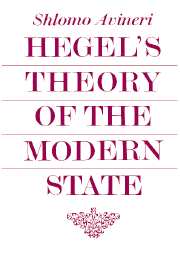Book contents
- Frontmatter
- Contents
- Title in the Series
- Preface
- 1 Beginnings
- 2 Positivity and Freedom
- 3 The Modernization of Germany
- 4 The New Era
- 5 Modern Life and Social Reality
- 6 The Owl of Minerva and the Critical Mind
- 7 The Political Economy of Modern Society
- 8 Social Classes, Representation and Pluralism
- 9 The State – the Consciousness of Freedom
- 10 War
- 11 The English Reform Bill – the Social Problem Again
- 12 History – the Progress towards the Consciousness of Freedom
- Epilogue
- Bibliography
- Index
1 - Beginnings
Published online by Cambridge University Press: 05 June 2012
- Frontmatter
- Contents
- Title in the Series
- Preface
- 1 Beginnings
- 2 Positivity and Freedom
- 3 The Modernization of Germany
- 4 The New Era
- 5 Modern Life and Social Reality
- 6 The Owl of Minerva and the Critical Mind
- 7 The Political Economy of Modern Society
- 8 Social Classes, Representation and Pluralism
- 9 The State – the Consciousness of Freedom
- 10 War
- 11 The English Reform Bill – the Social Problem Again
- 12 History – the Progress towards the Consciousness of Freedom
- Epilogue
- Bibliography
- Index
Summary
Valedictory addresses are rarely original, and if one tries to find in them the mature man hiding inside the adolescent student, one is apt to be disappointed. Yet in reflecting the conventional wisdom of an age as viewed through the somewhat idealistic prism of youth, they give an indication of the intellectual climate nurtured by a culture.
Hegel's valedictory address on graduating in 1788, at the age of eighteen, from the Stuttgart Gymnasium, is no exception. The subject is slightly outlandish and somewhat stilted: a comparison between the Germans and the Turks. As one may expect, the theme is edifying: the barbarity of the Turks should not be ascribed to any lack of talent in that martial nation; rather it should be recognized as a consequence of the fact that the Turkish state neglected the education of its subjects: ‘so great is the influence education thus has on the whole welfare of a state!’ Education, Bildung, is hailed as the foundation of the body politic: manners, arts, sciences constitute the elements of society, and it is the prime duty of the state to further education and learning.
All the basic beliefs of the German Enlightenment are clearly visible in this speech: like many other of Hegel's expressed views at that period, they attest to the humanistic background of his education prior to his entering the Tübingen Stift, where he studied for five years (1788–93).
- Type
- Chapter
- Information
- Hegel's Theory of the Modern State , pp. 1 - 12Publisher: Cambridge University PressPrint publication year: 1972

